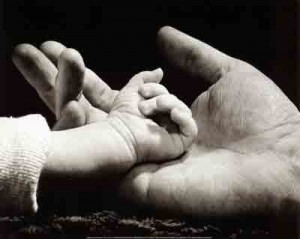 I once heard a story about a missionary who was working in an impoverished area where fathers were not a part of the everyday lives of the children. When she taught them the “Our Father,” they couldn’t understand what the love of a father was like. So, with the best of intentions, she taught them to pray, “Our Grandmother,” since their grandmothers were the ones who filled the role of caretaker in their families.
I once heard a story about a missionary who was working in an impoverished area where fathers were not a part of the everyday lives of the children. When she taught them the “Our Father,” they couldn’t understand what the love of a father was like. So, with the best of intentions, she taught them to pray, “Our Grandmother,” since their grandmothers were the ones who filled the role of caretaker in their families.
While I understand the intentions of this missionary, something is deeply lacking if we omit the word “Father” when talking about the first person of the Trinity. In doing so, we lose the richness of the image that God has given us for himself. A father is not like a mother, or a grandmother. There are many people in our society who have never had the experience of a good, loving father. However, the solution is not to change the name of God the Father, but rather to help them to see that they have a heavenly Father who cares for them in a deep and profound way.
I have been blessed with three wonderful fathers in my own life – my father, my father-in-law, and my husband. These men have taught me what the love of a father consists in, and have consequently made the love of the heavenly Father more real for me. Through their example, I’ve learned three things about the uniqueness of a father’s love.
A father’s love is constant and stable
When we read sacred Scripture, we encounter a God whose love is tireless. No matter what the offense of his people, God continues to care for them. God speaks of his love and faithfulness through the prophets, but more importantly, he demonstrates these virtues through action. He does not abandon the Israelites in the desert, even when they rebel against the law revealed through Moses. Though his people wander far from him in sin, God always welcomes them back, like the faithful father in the parable of the Prodigal Son.
Our earthly fathers show us the same love when they remain faithful to their families. By their presence, day in and day out, they show us what constant love looks like. Fathers are the ones who enable a family to feel a sense of security. A good father makes his home feel safe. I remember, as a small child, never feeling fully safe during a thunderstorm unless my father was home. This is the kind of safety we have with God, whose goodness and providence covers all our needs.
A father’s love is just and merciful
There is often confusion about God’s behavior toward his people in the Scriptures, especially the Old Testament. “If God loves us,” many wonder, “then why did he punish the Israelites?”
Yet discipline and punishment are expressions of a father’s love as he teaches his child to be virtuous. Part of the growth in virtue and toward maturity is correcting wrong behavior and forgiving a child who has gone astray. A child does not want to misbehave for her father because she knows two things – her father is just (and therefore will punish her if she is disobedient) and her father is merciful (and therefore worthy of her love). A father’s love teaches us that there are consequences for misbehavior, but does so in the context of forgiveness. The root of the word discipline is the same as that of disciple, or follower. A father’s role is to teach his children to live the virtues and to model those virtues as well, as God led the Israelites to the Promised Land, and continues to lead us today.
A father’s love is quietly strong
There is no better image of true male strength than a father cradling his newborn. His power is focused on protection, care and compassion. We recall that God revealed himself to Elijah not in thunder or fire, but in a quiet whispering sound. His great strength is revealed in his willingness to be small for our sake.
Mothers and grandmothers have their own ways of loving, which are wonderful and life-giving. But a love that is strong, constant, and both merciful and just, is displayed most beautifully through a good earthly father, who helps to reveal God’s love to his children.
Reprinted with permission from FathersForGood.org.



